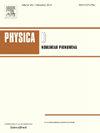考虑时间分数阶四阶偏微分方程的时间因果关系的fPINNs方法
IF 2.9
3区 数学
Q1 MATHEMATICS, APPLIED
引用次数: 0
摘要
对于具有高阶导数和强非线性的时间分数阶偏微分方程,传统分数阶物理信息神经网络(fpinn)方法的精度受到严重影响。本文研究了求解时间分数阶四阶偏微分方程的一种新的尊重时间因果关系的fPINNs (RTC-fPINNs)方法。首先,引入辅助函数将目标方程转化为两个二阶物理系统。其次,在梯度网格上通过L1格式逼近Caputo分数阶导数,解决解的初始奇异性,并利用神经网络的自动微分得到相应的整数阶导数。然后,在训练神经网络模型时,采用边界条件软硬约束对应的重公式损失函数,尊重物理系统的内在因果结构。最后,通过时间分数阶四阶次扩散方程、时间分数阶Kuramoto-Sivashinsky方程和Cahn-Hilliard方程等多种数值场景,验证了RTC-fPINNs方法的有效性和鲁棒性。值得注意的是,在使用相同参数值时,所建立的rtc - fpinn方法的误差精度明显优于传统的fpinn方法。本文章由计算机程序翻译,如有差异,请以英文原文为准。
RTC-fPINNs: Respecting temporal causality fPINNs method for time fractional fourth order partial differential equations
The accuracy of conventional fractional physics-informed neural networks (fPINNs) approach suffers dramatically for time fractional partial differential equations (PDEs) with high order derivative and strong nonlinearity. In this paper, a new respecting temporal causality fPINNs (RTC-fPINNs) method for solving time fractional fourth order PDEs is studied. To start with, an auxiliary function is introduced to transform the objective equations into two second order physical systems. Next, the Caputo fractional derivative is approximated through the L1 scheme on graded mesh for resolving the solution’s initial singularity, and correspondingly, the integer order derivatives are obtained via leveraging automatic differentiation of neural networks. Then, the reformulation loss functions corresponding to soft and hard constraints of boundary conditions are adopted to respect the intrinsic causal structure of the physical systems when training the neural network models. Finally, various numerical scenarios, including time fractional fourth order subdiffusion equation, time fractional Kuramoto–Sivashinsky and Cahn–Hilliard equations, are conducted to validate the remarkable effectiveness and robustness of the RTC-fPINNs method. It is noteworthy that, when using the same parameter values, the error accuracy of the established RTC-fPINNs approach is significantly better than that of the conventional fPINNs method.
求助全文
通过发布文献求助,成功后即可免费获取论文全文。
去求助
来源期刊

Physica D: Nonlinear Phenomena
物理-物理:数学物理
CiteScore
7.30
自引率
7.50%
发文量
213
审稿时长
65 days
期刊介绍:
Physica D (Nonlinear Phenomena) publishes research and review articles reporting on experimental and theoretical works, techniques and ideas that advance the understanding of nonlinear phenomena. Topics encompass wave motion in physical, chemical and biological systems; physical or biological phenomena governed by nonlinear field equations, including hydrodynamics and turbulence; pattern formation and cooperative phenomena; instability, bifurcations, chaos, and space-time disorder; integrable/Hamiltonian systems; asymptotic analysis and, more generally, mathematical methods for nonlinear systems.
 求助内容:
求助内容: 应助结果提醒方式:
应助结果提醒方式:


